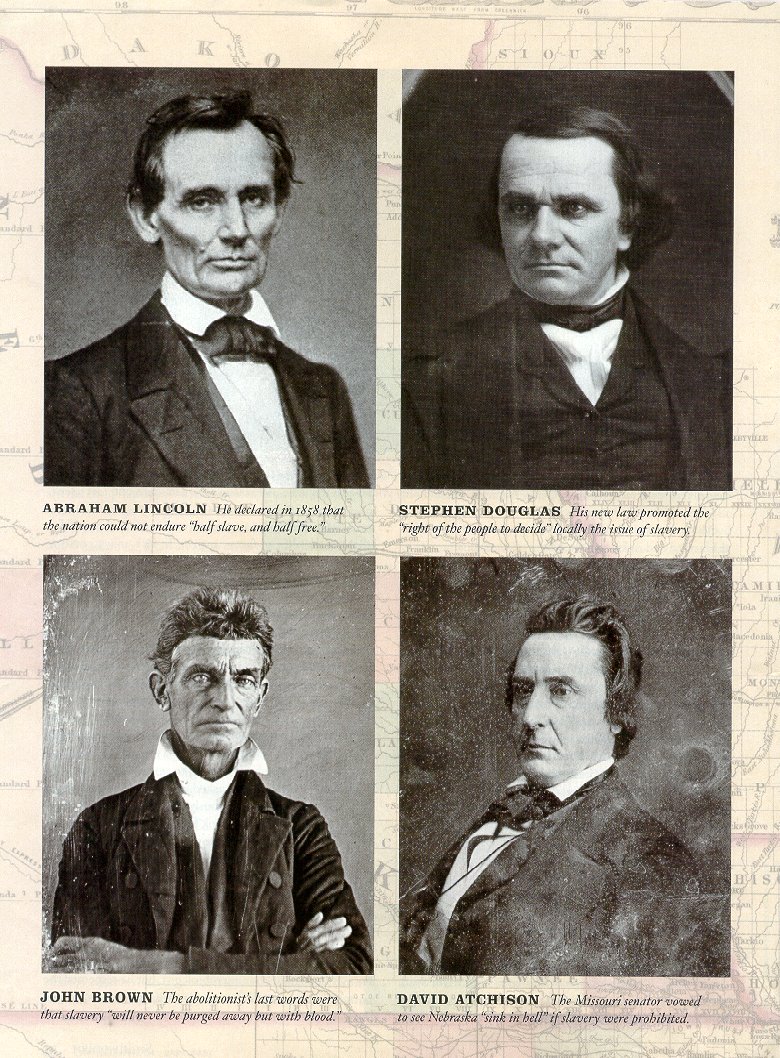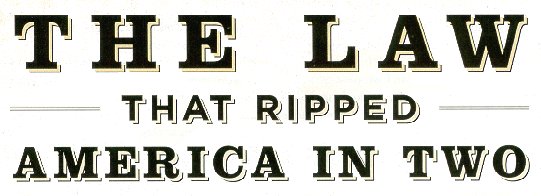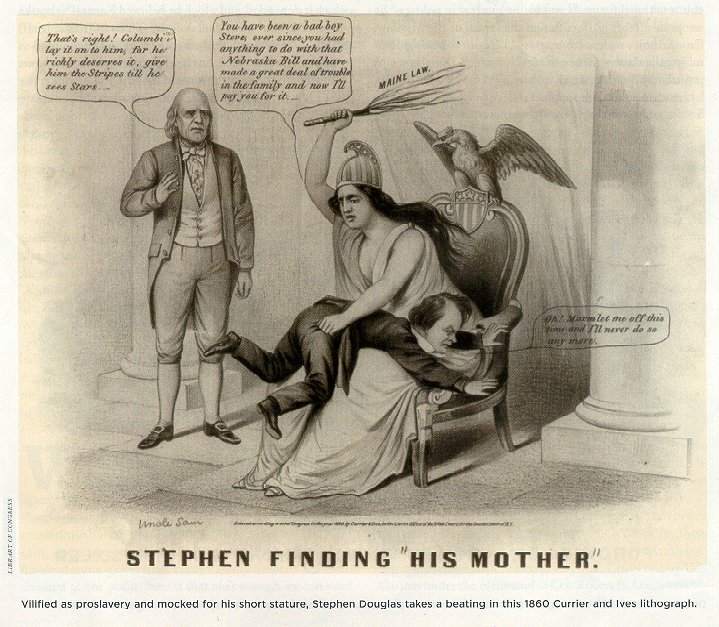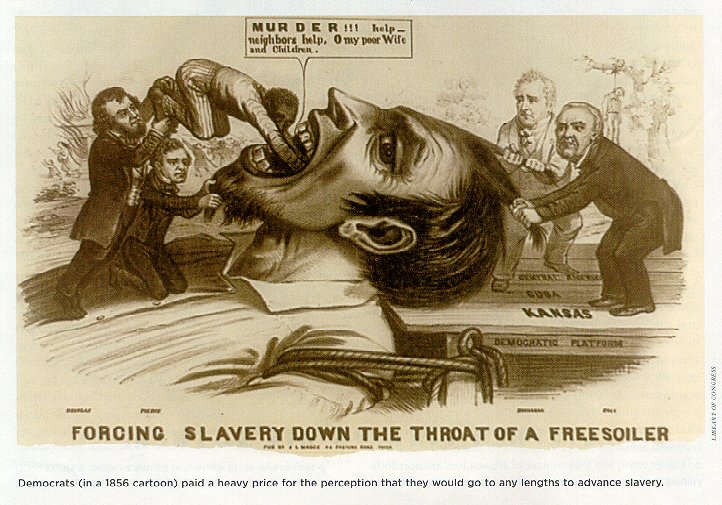


set the stage for America's civil war ~ BY ROSS DRAKE Smithsonian magazine, MAY 2004
In a sense, the five proslavery settlers were casualties not merely of Brown's bloody-mindedness but also of a law described by historians William and Bruce Catton as possibly "the most fateful single piece of legislation in American History." Ironically, the Kansas-Nebraska Act, passed by Congress 150 years ago this month (100 years to the week before the landmark Supreme Court decision -- Brown v. Board of Education -- barring school segregation), was meant to quiet the furious national argument over slavery by letting the new Western territories decide whether to accept the practice, without the intrusion of the federal government. Yet by repealing the Missouri Compromise of 1820, which had outlawed slavery everywhere in the Louisiana Purchase north of Missouri's southern border (except for Missouri itself), the new law inflamed the emotions it was intended to calm and wrenched the country apart. As a result of the legislation's passage, resentments became bloody hostilities, the Democratic Party lay shattered, a new Republican Party was created and an Illinois lawyer named Abraham Linconl embarked on the road to the presidency. Had the law made civil war unavoidable? "I'd put it this way," says historian George B. Forgie of the University of Texas. "Whatever the chances of avoiding disunion before Kansas-Nebraska, they fell dramatically as a result of it." The author of the bill -- officially called "An Act to Organize the Territories of Nebraska and Kansas" -- was Senator Stephen A. Douglas of Illinois, eclipsed in history by his rival Lincoln, but for most of his lifetime a figure of far greater national consequence. Short-legged and barrel-chested, with a head disproportionately large for his body, the 5-foot-4 Democrat, known to admirers as the Little Giant, was gifted, dynamic, rough-mannered man who seemed destined to be president. Ferocious in debate (the author Harriet Beecher Stowe likened his forensic style to "a bomb... [that] bursts and sends red-hot nails in every direction"), he first ran for Congress at age 25 against Lincoln's law partner, John T. Stuart. (Douglas lost by 36 votes.) Douglas biographer Robert W. Johannsen reports that Stuart once became so incensed at Douglas' language that he "tucked him under his arm, and carried him around the Springfield markethouse. Douglas, in return, gave Stuart's thumb such a bite that Stuart carried the scar for many years afterward."
The problem, as always, was slavery. As the boundaries of the nation moved westward, threatening the tenuous balance of power between slaveholding states and free states, Congress had struck the bargains needed to keep the Union intact without confronting the issue of slavery head-on. One accommodation had followed another, but time was not on the side of evasion. Observes historian Paul Finkelman of the University of Tulsa: "As Lincoln said in his second inaugural address, 'all knew that this interest' -- slavery -- 'was somehow the cause of the war.' That 'interest' was not likely to go away peacefully. Sooner or later the American people had to come to terms with it." Mildly opposed to slavery in principle, Douglas regarded the issue as more a dangerous distraction than a fundamental obstacle to the Republic's survival. White America's destiny, in his view, was to extend its domain from the Atlantic to the Pacific, not to agonize over the dubious rights of those he considered his racial inferiors. With that perspective in mind, he had helped arrange the historic Compromise of 1850, which admitted California to the Union as a free state while placing no restrictions on slavery in the new territories of Utah and New Mexico. Voters there would decide for themselves whether or not to permit slavery, and the principle would be known as popular sovereignty. But four years later Douglas had a different agenda. Early in 1854, hoping to open the way for a railroad linking California with Illinois and the East, he wanted Congress to approve the establishment of the Nebraska Territory in the vast wildernes west of Missouri and Iowa. Douglas had sought such approval before, but lacked the Southern votes to get it. Further bargaining would now be necessary, and the stakes this time would include the Missouri Compromise, for more than 30 years the foundation of federal policy regarding the expansion of slavery. If Nebraska were organized with the compromise in place, it would be slave-free and slave-state Missouri would be bordered on three sides by free states and territories. Missouri's influential -- and rabidly pro-slavery -- senator, David Atchison, had a problem with that; he wanted Nebraska opened to slavery, and vowed to se it "sink in hell" if it were not. Thus began a delicate negotiation in which Douglas, who had once described the Missouri Compromise as "a sacred thing, which no ruthless hand would ever be reckless enough to disturb," searched for a politic way of disturbing it -- something short of outright repeal. But his would-be Southern allies, fearing that any ambiguity about the compromise's survival would discourage slave-holders from moving to Nebraska, wanted it struck down unequivocally. Douglas was reluctant, but finally agreed. "By God, sir," he is said to have exclaimed to Kentucky senator Archibald Dixon, "you are right. I will incorporate it into my bill, though I know it will raise a hell of a storm." He was right about that. Even as he saw his bill through the Senate (it now called for the division of Nebraska into two territories, one of them Kansas) and an uneasy House of Representatives, vilification rained from the pulpit, the press and a Congressional vanguard of Free-Soilers, as those who opposed slavery's extension were known. At one point the Senate received a petition 250 feet long and signed by more than 3,000 New England clergymen urging the bill's defeat "in the name of Almighty God." Douglas detested abolitionists and sought in vain to cast the protests as the work of extremists.
Though Douglas later observed that he could have made his way from Boston to Chicago "by the light of my own effigy," he was not about to be intimidated. He was, after all, a practical man, and he saw Kansas-Nebraska as a practical bill. By transferring authority over slavery from Congress to the territories themselves, he believed he was removing a threat to the Union. Nor did he think it likely that slavery would spread from the 15 states where it existed to the areas being opened for settlement. But when it came to judging public feeling on the issue, the senator was, unhappily, tone-deaf. "He was a Northern man who was Southern in his views on race," explains Finkelman. "He said he didn't care whether slavery was voted up or down, but most Northerners did care. He may have been the only person in America who didn't. Many Northerners, and Lincoln is a great example, thought the Missouri Compromise was just a notch below the Constitution as a fundamental part of the American political framework. They saw it as putting slavery on the road to extinction, and that was for them a sacred goal. Kansas-Nebraska betrayed this." And so, the battle lines were drawn. Douglas seemed unfazed at first, confident he could undo the damage. He soon discovered otherwise. Speaking in Chicago on behalf of his party to kick off the 1854 Congressional election campaign in Illinois -- though he wasn't on the ballot himself -- Douglas was interrupted by "an uproar of shouts, groans and hisses," reports Johannsen. "Missiles" were thrown, and "to the delight of the crowd, Douglas lost his temper, denouncing the assemblage as a mob and replying to their taunts by shaking his fist, which only intensified the din..." Douglas put up with the heckling for more than two hours, then angrily strode from the platform. "It is now Sunday morning," he was said to have shouted back at his tormentors (though some historians doubt that he did). "I'll go to church, and you may go to hell!" The ensuing election confirmed the devastating impact of Douglas' bill on his Democratic party. Opponents of the Kansas-Nebraska Act carried both houses of the Illinois legislature, which at that time still elected U.S. Senators, and free-state Democrats lost 66 of their 91 seats in the House of Representatives. Suddenly, the Democrats found themselves a Southern party, one that would be able after 1856 to elect only one president in the remainder of the century. |
|

|
|
While Douglas viewed popular sovereignty as a bedrock democratic value, Lincoln saw its application to slavery as a callous statement of moral indifference. And he equated revoking the Missouri Compromise with repudiating the Declaration of Independence itself. "Near eighty years ago," he observed, "we began by declaring that all men are created equal; but now... we have run down to the other declaration, that for some men to enslave others is a 'sacred right of self-government.' "

Though Lincoln's feelings about what he colled "the monstrous injustice of slavery" were sincere, he was no abolitionist, and he felt bound to accept slavery where it existed. He was, like Douglas, a practical man, with wom the Union always came first. He endorsed the spirit of compromise on which it depended, and which he believed Kansas-Nebraska subverted. "And what shall we have in lieu of [this spirit]?" he asked. "The South flushed with triumph and tempted to excesses; the North, betrayed, as they believe, brooding on wrong and burning for revenge. One side will provoke; the other resent. The one will taunt, the other defy; one aggresses, the other retaliates." That is precisely what happened. "Any plausible explanation of the failure to find another sectional compromise in 1860-61 would have to include the fact that [trust in such agreements] took a deadly hit with Kansas-Nebraska," says Forgie. "Why would anyone sign on to a compromise again?" And once awakened, the South's hope that Kansas might become the 16th slave state took on a tenacious life of its own. When the North proved equally determined to keep Kansas free, the territory turned into a battlefield. Events quickly took an ominous turn. When New England abolitionists formed the Emigrant Aid Company to seed Kansas with antislavery settlers, proslavery Missourians sensed an invasion. "We are threatened," an acquaintance complained in a letter to Senator Atchison, "with being made the unwilling receptacle of the filth, scum and offscourings of the East... to preach abolition and dig underground Railroads." In fact, most emigrants did not go to Kansas to preach anything, much less to dig. As likely to be antiblack as they were antislavery, they went for land, not a cause. Likewise, most proslavery settlers had neither slaves nor the prospect of having any. Yet these distinctions didn't much matter. Kansas became fpart of the larger American drama, and the few thousand setlers who made their home in the territory found themselves surrogates, reluctant or not, of the inexorable issues that threatened the Union. "Kansas," says Forgie, "much like Korea or berlin in the Cold War, readily took form as the arena in which a battle was being waged for much larger stakes. Which section's institutions would shape the future of the continent?"
The territory was soon awash with secret societies and informal militias, formed ostensibly for self-defense, but capable of deadly mischief on both sides. Kansas was a powder keg awaiting a match, and it found one in the shooting of Douglas County sheriff Samual Jones, an unrestrained proslavery man, by an unknown assailant, as he sat in his tent outside the Free-Soil stronghold of Lawrence. Soon afterward, the Douglas County grand jury, instructed by a judge angered by what he regarded as Free-Soilers' treasonous resistance to the territorial government, returned sedition indictments against the Free-Soil "governor," Charles Robinson, two Lawrence newspapers and the town's Free State Hotel, supposedly being used as a fortress. Soon a posse descended on Lawrence, led by a federal marshal who made several arrests before dismissing the troops. It was then that Sheriff Jones, recovered from his wound (but not, in the view of historian Allan Nevins, from being "a vindictive, blundering fool"), took over the posse, which looted the town, wrecked the newspapers' presses, set fire to Robinson's house and burned the hotel after failing to destroy it with cannon fire.
It was a bad day for Lawrence, but a better one for the nation's antislavery press, which made the sack of Lawrence, as it was called, sound like the destruction of Carthage. "Lawrence in Ruins," announced Horace Greeley's New York Tribune. "Several Persons Slaughtered -- Freedom Bloodily Subdued." (In fact, the only fatality in Lawrence was a slave-stater struck by falling masonry.) As exaggerated as the "sack" may have been, in the climate of the day it was bound to have consequences. John Brown quickly set them in motion. He had been on his way to help defend Lawrence with a group called the Pottawatomie Rifles when he learned he was too late and turned his attention to the unfortunate Doyles and their neighbors. (Three years later, on October 16, 1859, Brown and his followers would stage a bloody attack on a federal armory in Harpers Ferry, Virginia. Cornered by U.S. Marines under the command of Col. Robert E. Lee, a wounded Brown would be taken prisoner, convicted and hanged.)
Sometimes they seemed not to be trying, as when the tainted proslavery legislature made even questioning the right to hold slaves in Kansas a felony and maid aiding a fugitive slave a capital offense. Neither law was enforced, but that was probably not the point. Unable to match the flood of Free-Soil emigrants pouring in from the Ohio Valley and elsewhere, slave-staters seemed more determined than ever to make the territory inhospitable to those opposed to slavery. And they did not lack for allies. "The admission of Kansas into the Union as a slave state is now a point of honor with the South," wrote South Carolina congressman Preston Brooks in March 1856. "It is my deliberate conviction that the fate of the South is to be decided with the Kansas issue." Thus freighted with national consequence, resolution of the Kansas question would hardly be left to Kansans alone. Under the circumstances, it seems unsurprising that presidents Franklin Pierce and James Buchanan, Northern men of pronounced Southern sympathies, both endorsed the legitimacy of the illegitimate legislature over the objections of a succession of territorial governors. Among them was Robert J. Walker, a former Treasury secretary and a Douglas ally. Meeting with President Buchanan before leaving Washington in the spring of 1857, he spelled out his understanding, with which Buchanan agreed, that Kansas would be admitted to statehood only after residents were able to vote freely and fairly on a state constitution. It sounded simple enough. But the difficulty of its execution was made clear when, at a welcoming banquet in Kansas, the diminutive Walker was upbraided by one of his proslavery hosts: "And do you come here to rule us? You, a miserable pigmy like you?... Walker, we have unmade governors before; and by God, I tellyou, sir, we can unmake them again!" Certainly they were ready to try. After Free-Soilers refused to participate in what they believed, with reason, would be a rigged election for constitutional convention delegates, the proslavery convention, meeting in the town of Lecompton, made a crucial decision. Rather than being allowed to vote up or down on a proposed constitution, Kansans would be given a choice between a constitution with slavery and a constitution without it. But the constitution without it contained a clause allowing slaveholders already in the territory to retain not only their slaves but the slaves' offspring. Free-Soilers, naturally, saw their choice as being not between slavery and its absence, but between a little bit of slavery and a lot of it -- or, as one Kansan put it, between taking arsenic with bread and butter and taking it straight. When the options were put to a vote, Free-Soilers once again declined to take part. By this time, the battle had been joined in Washington. Over the objections of Governor Walker, Buchanan had decided to accept the verdict of the Lecompton convention and the inevitable approval of its slave-state constitution. The president's decision led him to an angry confrontation with Douglas, who saw it as a betrayal of the very popular sovereignty on which the senator had staked his career. Now, as always, Douglas saw himself as the defender of the sane middle gorund, where the Union might be saved from extremists. But when the House of Representatives, at Douglas' urging, refused to accept the slave-state constitution submitted by Kansas, Southerners who had supported Douglas' notion of popular sovereignty when it suited theri purposes now abandoned both it and Douglas. And Buchanan, who had boldly proclaimed Kansas "as much a slave state as Georgia or South Carolina," became Douglas' implacable enemy. The South had elected Buchanan, and he was desperately afraid of secession; he couldn't bring himself to back down on Lecompton. Yet neither could Douglas. Whatever a compromise might have gained him in the South would have been lost in the North and the West, where the Democrats were already in disarray. And though Douglas had made his reputation as a canny politician, he was also, at bottom, a patriot. He believed a national Democratic Party was needed to hold the Union together, and he believed he was needed to lead it. Douglas had never been a man of moderate habits, and his health in recent years had been suspect. But when, in 1860, he was at last nominated for the presidency, and found the party irretrievably damaged-- Southern Democrats promptly chose a candidate of their own, John C. Breckinridge, to oppose him -- he turned his remaining energy into a campaign that was as much for the Union as it was for himself. Meanwhile, Abraham Lincoln had been nominated as the presidential candidate of the new Republican Party, created in 1854 to oppose the spread of slavery. In October, accepting the inevitability of Lincoln's election and knowing that secession was no idle threat, Douglas courageously decided on a final tour of the South, hoping to rally sentiment to keep the nation whole. Butthough his reception was generally civil, the time for persuasion had passed. As if a symbol of the failure of his mission, the deck of an Alabama riverboat on which he and his wife were traveling collapsed, injuring them both and forcing Douglas to continue with the aid of a crutch. He received news of his defeat in Mobile, realized it augured a country divided and likely a war, and retired to his hotel "more hopeless," reported his secretary, "than I had ever before seen him." The following June, exhausted in body and spirit, Douglas died at age 48, just seven weeks after the fall of Fort Sumter in the opening salvo of the Civil War. |
 Back to Political Produce Stand
Back to Political Produce Stand
|
 Back to Crocuta Main
Back to Crocuta Main
|